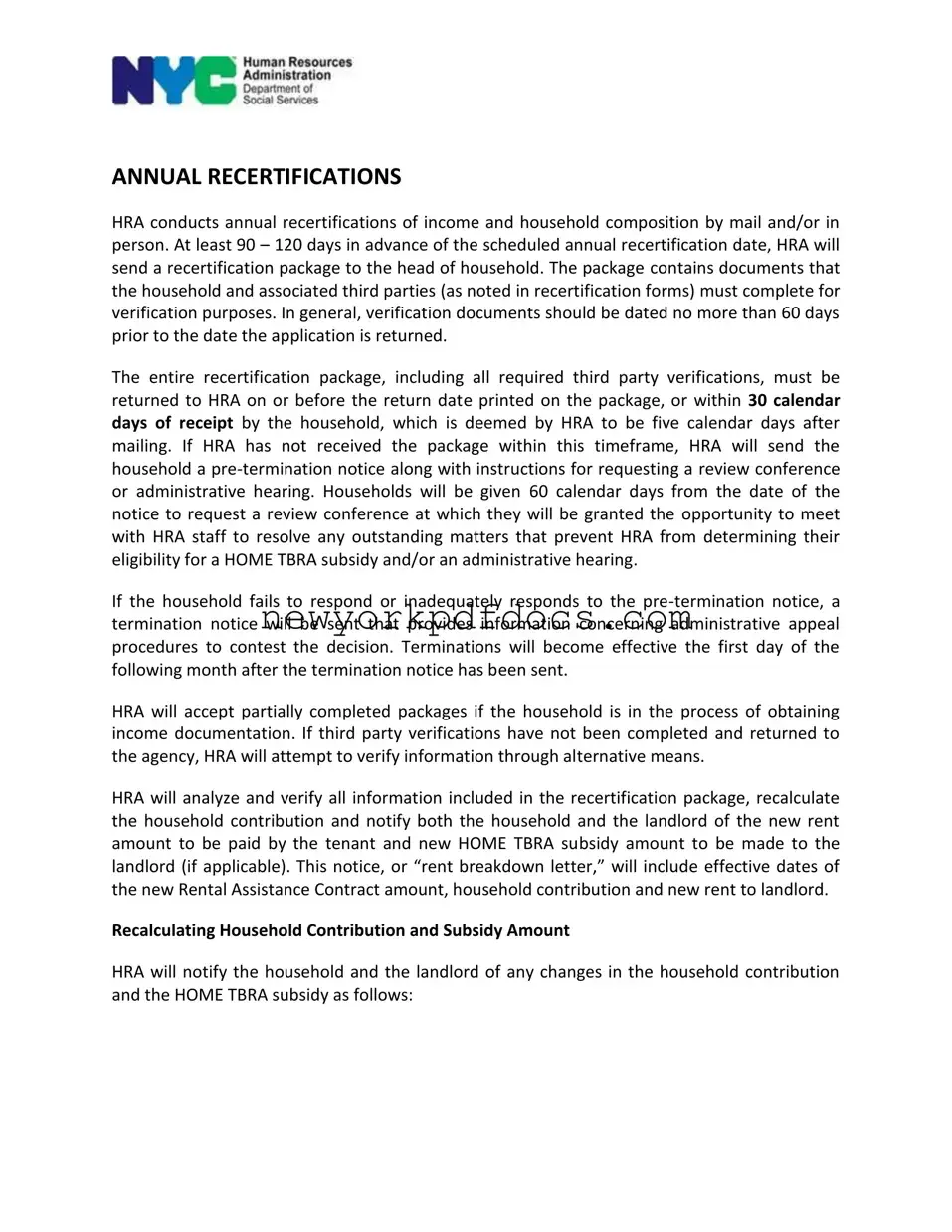ANNUAL RECERTIFICATIONS
HRA conducts annual recertifications of income and household composition by mail and/or in person. At least 90 – 120 days in advance of the scheduled annual recertification date, HRA will send a recertification package to the head of household. The package contains documents that the household and associated third parties (as noted in recertification forms) must complete for verification purposes. In general, verification documents should be dated no more than 60 days prior to the date the application is returned.
The entire recertification package, including all required third party verifications, must be returned to HRA on or before the return date printed on the package, or within 30 calendar days of receipt by the household, which is deemed by HRA to be five calendar days after mailing. If HRA has not received the package within this timeframe, HRA will send the household a pre-termination notice along with instructions for requesting a review conference or administrative hearing. Households will be given 60 calendar days from the date of the notice to request a review conference at which they will be granted the opportunity to meet with HRA staff to resolve any outstanding matters that prevent HRA from determining their eligibility for a HOME TBRA subsidy and/or an administrative hearing.
If the household fails to respond or inadequately responds to the pre-termination notice, a termination notice will be sent that provides information concerning administrative appeal procedures to contest the decision. Terminations will become effective the first day of the following month after the termination notice has been sent.
HRA will accept partially completed packages if the household is in the process of obtaining income documentation. If third party verifications have not been completed and returned to the agency, HRA will attempt to verify information through alternative means.
HRA will analyze and verify all information included in the recertification package, recalculate the household contribution and notify both the household and the landlord of the new rent amount to be paid by the tenant and new HOME TBRA subsidy amount to be made to the landlord (if applicable). This notice, or “rent breakdown letter,” will include effective dates of the new Rental Assistance Contract amount, household contribution and new rent to landlord.
Recalculating Household Contribution and Subsidy Amount
HRA will notify the household and the landlord of any changes in the household contribution and the HOME TBRA subsidy as follows:
Increases in Household Contribution
Increases in the household contribution will become effective the first day of the month following a full 30-day notice, provided that changes were reported by the next annual recertification following the increase in household income. If there has been misrepresentation of income by the household, or if the household caused a delay in the recertification process, HRA may make the rent change effective on the first day of the month following completion of the recertification (no 30-day notice provided), or retroactive to the date it would have been effective had it been reported in a timely manner. The household will be liable for any overpaid HOME TBRA subsidy payment and may be required to sign a repayment agreement.
Decreases in Household Contribution
Decreases in the household contribution will become effective on the anniversary date of the annual recertification, or, the first day of the month following the date any interim change was reported, provided said change was reported in a timely manner, 10 days. If the household causes a delay so that the recertification is not complete by the anniversary date, the rent change will be effective the first day of the following month after the recertification.
Increase in Household Size
A household must obtain HRA approval of any additional household member before the new member occupies the unit except for additions by marriage, domestic partnership, birth, adoption, or court-awarded custody in which cases the household must report these additions in a timely manner.
If a unit does not meet HQS standards due to an increase in household size, HRA will issue a new HOME TBRA coupon to the household, as funding allows, and the household will be required to relocate to an appropriately sized unit.
Households that add members will also be provided a larger unit size, if funding is available, and will be provided the opportunity to move. However, unless the addition of the household member(s) results in the HQS violation described above, the household will not be required to relocate.
Decrease in Household Size
Decreases in household size must be reported in a timely manner. When the household size decreases, the new household size must be used to determine the payment standard amount for the household beginning at the household’s first regular recertification following the change. If the household is “overhoused” according to HRA rent standards, the household will be required to relocate to an appropriately sized unit or pay the additional cost out of pocket to remain in the oversized unit.
If the household failed to report a change in composition in a timely manner, any difference in the allowable subsidy due to a reduced coupon size may be charged to the household retroactively from the first day of the month following the change and a new coupon will be issued to the household immediately, if funding is available. HRA also maintains the right to terminate assistance to the household for failure to report the change in household composition.
If an assisted household splits during the HOME TBRA tenancy term, HRA has broad discretion to determine who remains in the program. Either household may retain the coupon if there is mutual consent or a court-stipulated determination as to which household retains assistance.




